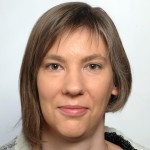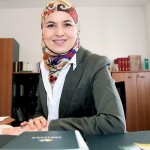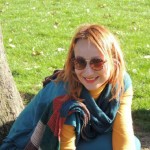Experts Contribution
HIP
Vesna Ivezić

Vesna Ivezić is a teacher of sociology, philosophy and logic, in Secondary School Mate Blazine in Labin, Istria. Vesna graduated in Philosophy and Sociology at the Philosophical University in Zagreb, received her Master’s (mr.sc.) at the Department of Sociology (field – Sociology of Religion) and is continuing her PhD studies also at the Department of Sociology. For many years she has been freelancing in various newspapers and published in literary magazines in Croatia. Vesna is the founder of NGO „Association for the Promotion of Human Rights, Freedom and Quality of Life- IDIA“. Wrote a book „Right to be Different“, which was a result of research conducted under the same name, about discrimination of Roma children in the upper grades of elementary schools in different parts of Croatia, and was also cooperating with the Association of Roma from Istria-Pula, being one of the initiators of the bilingual (Romani-Croatian) magazine „The Voice of Roma in Istria“. Since 2009, in cooperation with ASU (Academy of Free Minds) Leonardo from Pula, has been organizing Bunker Festival of Prohibited and Forgotten Films“, dedicated to the affirmation of freedom of artistic expression. The Festival also holds a round table „Censorship, Freedom of Creativity and the Position of Author”. Often attends professional conferences and lectures for teachers, as well as scientific conferences, and publishes in scientific magazines. Her interests are: human rights, tolerance, xenophobia, racism, ecology, shortly, – considering all the possibilities for achieving freedom and equality for all. She is a member of the Croatian Sociological Society, Croatian Philosophical Society, and Croatian Association for Integration.
Tihana Magaš

Tihana Magaš was born and grew up in Osijek, Croatia and he studied at University in Zadar, finished with the degree of sociology and history professor. Since her high school days he was interested and involved in the themes related to human rights, war victims, the Holocaust, and in the same time she was doing many workshops promoting tolerance, equality/uniqueness which awaken a critical awareness of young people on sensitive themes of society in which they live. At the moment she works in the Gymnasium Vladimir Nazor in Zadar.
Tatjana Jurić

Tatjana Jurić is IB history and Latin teacher in Gimnazija Banjaluka, Bosnia and Herzegovina. As a teacher Tatjana is keen on using an innovative pedagogical approach and trying new creative teaching techniques. The important objectives in her work are a better understanding about the past through critical analysis of historical sources, developing tolerance and multiple perspectives, recognizing uses and misuses of historical myths and facts, expanding horizons and increasing awareness about the danger of radical, extremist movements and totalitarian regimes. Currently Tatjana is involved in several cross-cultural and research projects that deal with different historical issues.
Monika Montanič

Monika Montanič is the project coordinator for the Anne Frank – A History for Today -traveling exhibition in Slovenia. She has a Bachelor degree in History and she works at the National Museum of Contemporary History in Slovenia (MNZS). As a student she worked part time at MNZS as an exhibition guide at the permanent exhibition – Slovenians in the 20th Century – and many other temporary exhibitions. At MNZS she is involved in its program for developing educational literature and courses for elementary and high school pupils and senior citizens, where special care and consideration is given to high school seniors who are preparing for their state final exams in history. At the Museum she also organizes special events for kindergarten and younger children, where she is involved in the organization of the event and the preparation of suitable content and literature. She also attended many educational courses for the initiative to make art institutions more accessible to people with special needs. That is why she arranged all the text from the traveling exhibition Anne Frank – A History for Today – also in Braille and developed a special workshop for the peer guide trainings. Besides her involvement in executing the museum’s educational programs and coordinating the international Anne Frank project in Slovenia, her main role at the MNZS is currently in its P.R. department.
Dr. Mišo Dokmanović

Dr. Mišo Dokmanović is Associate Professor at the Faculty of law, Ss. Cyril and Methodius University in Skopje, Macedonia where he teaches courses History of Law and Contemporary Macedonian History at the Department of Political Science. Dr. Dokmanović holds LLB, LLM and PhD degrees from this institution as well as MA in Contemporary Diplomacy from the Mediterranean Academy for Diplomatic Studies. His PhD thesis (2010) was focused on the state and legal development in Macedonia within the Yugoslav federation in the period 1946 – 1953 while his MA thesis (2005) examined the dissolution of Yugoslavia and Macedonian independence process. He has participated in conferences, study visits and lectured in over 45 countries. Dr. Dokmanović was a Research and Visiting Fellow at a number of leading academic institutions including University of Michigan, University of Florida, University of Illinois and Central European University. He is also an invited lecturer at many continuing and summer programs, political academies and training programs including Preparing Global Leaders Academy – Jordan and Preparing Global Leaders Institute. At the same time, he has attended the one-month Yad Vashem winter school on Holocaust Studies in 2008. Apart from his academic career, Dr. Dokmanović has 10+ years’ experience in international projects in Macedonia and the region. He has worked on projects financed by USAID, EC (TEMPUS, FP7), Austrian Development Cooperation, and World University Service – Austria, Soros Foundation, NATO and others.
Miljenko Hajdarović

Miljenko Hajdarović works as a history, sociology, politics and civics teacher in Cakovec High School. Main focus of interest is holocaust and human right education and usage of ICT in education.
Maja Pandža

Maja Pandža is a history teacher and librarian at Catholic School Center ‘’Saint Paul’’ in Zenica, Bosnia and Herzegovina. For several years now, she has been teaching World history to primary and high school students, with particular focus on South-East Europe and national history by integrating multi perspective historical approach. She is interested in exploring historical heritage and the way history affects today’s Balkan societies as well as open access to information and democratization through information-communication technologies. In collaboration with teaching staff, she develops syllabi, organize information literacy workshops, draft collection development strategies and serve as integral part of teaching process. She holds a Bachelor degree in Library and Information Science and Master degree in History from the University of Sarajevo.
Jelena Ðureinović

Jelena Ðureinović is a PhD candidate in Eastern European history at the International Graduate Centre for the Study of Culture at Justus Liebig University in Giessen. She holds a Master of Arts degree in Nationalism Studies from Central European University in Budapest, where she graduated with distinction with the thesis on political and legal rehabilitation of Dragoljub Mihailović and the Yugoslav Army in the Homeland in contemporary Serbia. Her doctoral research focuses on the official politics of memory on the Second World War in post-Milošević Serbia where she analyzes state-sanctioned work on the official memory on the war and its actors, focusing on the institutions, decision-making, legislation, and inconsistencies in this process, as well as the local practices of remembrance in relation to the official memory politics. Jelena’s research interests include politics of memory on the Second World War in Southeastern Europe, legislation on rehabilitation and crime denial and its implementation, and role of historians as political actors. Another important interest of hers is transitional justice, memory work and dealing with the problematic past in the post-Yugoslav space. Furthermore, Jelena is a participant in “Balkan 100: Recollecting Memories in the Western Balkans”, the project that brings together a group of young scholars from Bosnia and Herzegovina, Serbia, Kosovo, and Macedonia. Besides that, she is writing for the political magazine Margina.
Ivan Karadarević

Ivan Karadarević is a professor of philosophy, rhetoric and civic education at Second Grammar School in Kragujevac, Serbia. During all those years of work in the school education system he practices different forms of teaching, and was an author and realizer of a program for teachers’ professional development. Currently he is one of the moderators as young expert in implementation of the National Curriculum framework. He participated in various non- formal education programs and possesses numerous certificates which confirm him as an experienced trainer in the field of human rights, public speaking, debate and global education. Ivan believes that it is necessary to encourage the development and education of young people through additional NGO training programs. Primarily he focuses on working with youth and helps them in the process of active engagement in civil society, participating in school projects or others. Ivan is member of professional bodies such as Serbia Conference of Gymnasiums, Association for Development of Civic Education and Education for Democracy; representative of Cordia – Center for Education and Development of Open Society. He holds a specialist program for Civic education in Political Science from University of Belgrade.
Ida Ljubić

Ida Ljubić is a history teacher in the Hotel, Tourism and Catering Industry High School in Zagreb. She studied history and ethnology at the Faculty of Philosophy in Zagreb and completed postgraduate studies in history at the Central European University in Budapest. Her work encompasses teaching pupils with learning disabilities, as well as developing self-esteem and empowering pupils in vocational school through their involvement in projects such as the Model International Criminal Court Western Balkans (MICC WeB), Free2Choose, Crocus Project, the online project World Class Scholars and the International Cuisine Workshop with asylum seekers in Zagreb. Besides history, she teaches civic education subjects, such as human rights issues, the Holocaust and crimes against humanity prevention. She hopes that the project ”Historija, Istorija, Povijest – Lessons for Today” will contribute to breaking stereotypes and help create new methods and tools for teaching the history of Yugoslavia and its disintegration.
Dr. Dževada Šuško

Dr. Dževada Šuško is researcher and director of the Institute for Islamic Tradition of Bosniaks (www.iitb.ba) which is the research institution of the Islamic Community in Bosnia and Herzegovina. Thus, Dževada Šuško was appointed as the first woman in a leading position within the Islamic Community. She is as well Assistant Professor at the International University of Sarajevo, International Relations department. There she teaches courses related to the history, politics and society of Southeastern Europe, particularly former Yugoslavia as well as Bosnia and Herzegovina. She grew up in Germany where she completed most of her studies in history, political science and cultural anthropology at Heidelberg and Hamburg University. As a cosmopolitan, she did several studies abroad, such as in Florence, Ottawa, Ramallah and Madrid. Currently she is working on the publication of her PhD thesis “The Issue of Loyalty: Reaction of the Bosniaks to the Austro–Hungarian Empire (1878–1918)“. Dževada Šuško is the author of several book chapters and academic journal articles, such as the book on the former High Representative Christian Schwarz – Schilling or about the position of women in Bosnia and Herzegovina. Additionally, she is involved in NGOs, such as the Centre for Education and research “Nahla” (www.nahla.ba), and the Centre for Advanced Studies in Sarajevo (www.cns.ba).
Bojana Golubović

Bojana Golubović is a teacher of philosophy at Gimnazija “Svetozar Marković“, Niš. For eight years of direct, both formal and informal educational work, she has been involved in teaching and training philosophy, logic, civil education, debate, court simulation. From October 2013, she has joined the project of bilingual class of the Institut Francais in Serbia and since then she is a student of French language in order to become a teacher of philosophy in French for bilingual students. As a volunteer, she has been a member of the „Nauk nije bauk“, team which is responsible for organizing the biggest Science festival in South-East of Serbia. She is highly motivated to enhance the process of popularization of science in Serbia, hence, she joined the organization of „The Researcher’s Night“, „Pokreni se za popularizaciju nauke“ and „Nauk nije bauk“. Being interested in a form of an open dialogue, she became a member of the project „My Speech“ which gathers Debating Clubs of Valuas College in Venlo, the Netherlands and Gimnazija „Svetozar Markovid“, Niš, Serbia.
Besnik Emini

Besnik Emini graduated in history at University of Skopje, Republic of Macedonia in 2002. He finished his Master studies at the same university in 2009. He is a specialist in history of Balkan nations during the 18th and beginning of 19th century, national awakening and creation of national states in the Balkans. Currently he is a PhD candidate. He is a researcher at the Institute for Cultural and Spiritual Heritage of Albanians in Skopje, Republic of Macedonia. He is expert in history and history education, textbook author, giving workshops/lecturers, teacher trainer. He has worked as a history teacher from 2001 until 2008. In 2008 he was appointed President of State exam history commission for elementary school history teachers. He is an active member and one of the founders of History Teachers´ Association of Macedonia (Member of EUROCLIO). He has participated in workshops and seminars, conferences and other activities in Macedonia and other countries. He is promoting the idea that history should be treated without borders, and also textbooks should contain more lessons about modern-current history, and that school-education systems must pay more attention to human subjects, including history, in the age of rapid technology development to stop dehumanization of human values. His passions are languages, museums and bookshops.







